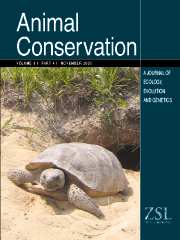Crossref Citations
This article has been cited by the following publications. This list is generated based on data provided by
Crossref.
Barrett, Louise
Gaynor, David
and
Henzi, S.Peter
2002.
A dynamic interaction between aggression and grooming reciprocity among female chacma baboons.
Animal Behaviour,
Vol. 63,
Issue. 6,
p.
1047.
MacDonald, David W.
Moorhouse, Tom P.
and
Enck, Jody W.
2002.
Handbook of Ecological Restoration.
p.
47.
Fiegna, Francesca
and
Velicer, Gregory J.
2003.
Competitive fates of bacterial social parasites: persistence and self–induced extinction ofMyxococcus xanthuscheaters.
Proceedings of the Royal Society of London. Series B: Biological Sciences,
Vol. 270,
Issue. 1523,
p.
1527.
GASCOIGNE, JOANNA C.
and
LIPCIUS, ROMUALD N.
2004.
Allee effects driven by predation.
Journal of Applied Ecology,
Vol. 41,
Issue. 5,
p.
801.
Carbone, C.
Frame, L.
Frame, G.
Malcolm, J.
Fanshawe, J.
FitzGibbon, C.
Schaller, G.
Gordon, I. J.
Rowcliffe, J. M.
and
Toit, J. T.
2005.
Feeding success of African wild dogs (
Lycaon pictus
) in the Serengeti: the effects of group size and kleptoparasitism
.
Journal of Zoology,
Vol. 266,
Issue. 2,
p.
153.
Lindsey, Peter A.
du Toit, Johan T.
and
Mills, M.G.L.
2005.
Attitudes of ranchers towards African wild dogs Lycaon pictus: Conservation implications on private land.
Biological Conservation,
Vol. 125,
Issue. 1,
p.
113.
Campbell, Ruairidh D.
Rosell, Frank
Nolet, Bart A.
and
Dijkstra, Vilmar A. A.
2005.
Territory and group sizes in Eurasian beavers (Castor fiber): echoes of settlement and reproduction?.
Behavioral Ecology and Sociobiology,
Vol. 58,
Issue. 6,
p.
597.
Gascoigne, Joanna
and
Lipcius, Romuald N.
2005.
Periodic dynamics in a two-stage Allee effect model are driven by tension between stage equilibria.
Theoretical Population Biology,
Vol. 68,
Issue. 4,
p.
237.
Kadam, Supriya V.
and
Velicer, Gregory J.
2006.
Variable patterns of density-dependent survival in social bacteria.
Behavioral Ecology,
Vol. 17,
Issue. 5,
p.
833.
Graf, J. A.
Gusset, M.
Reid, C.
Van Rensburg, S. Janse
Slotow, R.
and
Somers, M. J.
2006.
Evolutionary ecology meets wildlife management: artificial group augmentation in the re‐introduction of endangered African wild dogs (Lycaon pictus).
Animal Conservation,
Vol. 9,
Issue. 4,
p.
398.
Gusset, M.
Slotow, R.
and
Somers, M. J.
2006.
Divided we fail: the importance of social integration for the re‐introduction of endangered African wild dogs (Lycaon pictus).
Journal of Zoology,
Vol. 270,
Issue. 3,
p.
502.
Deredec, Anne
and
Courchamp, Franck
2006.
Combined impacts of Allee effects and parasitism.
Oikos,
Vol. 112,
Issue. 3,
p.
667.
Bach, L.A.
Helvik, T.
and
Christiansen, F.B.
2006.
The evolution of n-player cooperation—threshold games and ESS bifurcations.
Journal of Theoretical Biology,
Vol. 238,
Issue. 2,
p.
426.
Marino, J.
Sillero‐Zubiri, C.
and
Macdonald, D.W.
2006.
Trends, dynamics and resilience of an Ethiopian wolf population.
Animal Conservation,
Vol. 9,
Issue. 1,
p.
49.
Johnston, S.D.
Ward, D.
Lemon, J.
Gunn, I.
MacCallum, C.A.
Keeley, T.
and
Blyde, D.
2007.
Studies of male reproduction in captive African wild dogs (Lycaon pictus).
Animal Reproduction Science,
Vol. 100,
Issue. 3-4,
p.
338.
Pudyatmoko, Satyawan
., Djuwantoko
and
., Yusuf Sabarno
2007.
Evidence of Banteng (Bos javanicus) Decline in Baluran National Park, Indonesia.
Journal of Biological Sciences,
Vol. 7,
Issue. 6,
p.
854.
Witkowski, Mark
2007.
Energy Sharing for Swarms Modeled on the Common Vampire Bat.
Adaptive Behavior,
Vol. 15,
Issue. 3,
p.
307.
Price, Elizabeth E.
and
Stoinski, Tara S.
2007.
Group size: Determinants in the wild and implications for the captive housing of wild mammals in zoos.
Applied Animal Behaviour Science,
Vol. 103,
Issue. 3-4,
p.
255.
Berec, Luděk
Angulo, Elena
and
Courchamp, Franck
2007.
Multiple Allee effects and population management.
Trends in Ecology & Evolution,
Vol. 22,
Issue. 4,
p.
185.
Buettner, U. K.
Davies‐Mostert, H. T.
Du Toit, J. T.
and
Mills, M. G. L.
2007.
Factors affecting juvenile survival in African wild dogs (Lycaon pictus) in Kruger National Park, South Africa.
Journal of Zoology,
Vol. 272,
Issue. 1,
p.
10.


